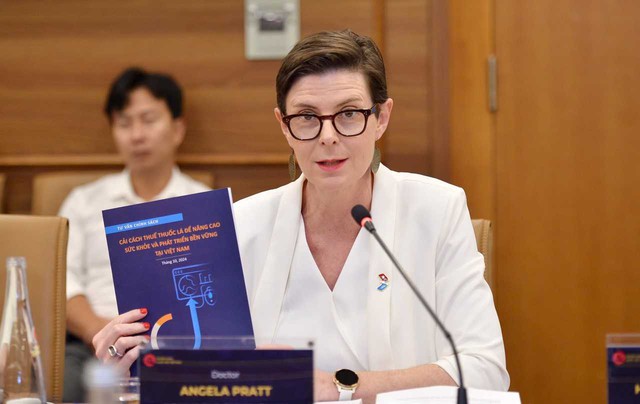WHO commends Viet Nam for raising tobacco and alcohol tax
VGP - WHO commends Vietnamese lawmakers for their careful deliberations and for their vote for the health of Vietnamese people from the risks of alcohol, tobacco and sugary drinks, said WHO Representative in Viet Nam Dr Angela Pratt.

WHO Representative in Viet Nam Dr Angela Pratt
The WHO Representative in Viet Nam made the announcement as National Assembly members voted to approve the revised Excise Tax Law, raising tobacco and alcohol tax, and introducing tax on sugar-sweetened beverages on June 14.
"We look forward to continuing to work together for a safer and healthier Viet Nam," Angela Pratt said.
The decisions support the strong leadership of the Minister of Finance, Nguyen Van Thang, and the Minister of Health, Dao Hong Lan, and the significant efforts of the Department of the Tax Policies, Fees and Charges Supervisory Authority at the Ministry of Finance; the Department of Legislation at the Ministry of Health; the Viet Nam National Tobacco Control Fund; the Health Strategy and Policy Institute under the Ministry of Health; and other key local and international public health partners, to protect the future of Vietnamese youth and community health.
WHO Representative in Viet Nam Dr Angela Pratt congratulated the Government of Viet Nam on adopting increased and new taxes on these unhealthy products, which will contribute to a healthier and more prosperous country.
"WHO is very pleased that law makers have seized this opportunity to achieve a 'win-win' of reducing the consumption of tobacco, alcohol and sugary drinks – and therefore reducing harm and health costs for decades to come – while generating additional revenue for key Government priorities. Reducing consumption of these unhealthy products will improve population health, and in doing so, workforce participation and productivity," said Dr Pratt.
In Viet Nam, high rates of smoking, alcohol consumption and rapidly rising consumption of sugar-sweetened beverages, including amongst youth, are threats to both health and economic growth in Viet Nam.
Today's vote is an important step which will contribute to Viet Nam's national and international targets and commitments to reduce rates of tobacco smoking, in particular. They create a valuable basis for future increases in tax, and therefore price, to reduce consumption of these harmful products.
Earlier, the National Assembly approved to raise the special consumption tax on alcohol and beer from the current 65 percent to 70 percent by 2027 (a one‑year delay) and ultimately 90 percent by 2031, aiming to curb excessive alcohol consumption.
In May 2025, the WHO urged Viet Nam to use this tax reform as a "historic opportunity" to impose a higher tobacco excise, specifically suggesting a VND 15,000 per pack specific tax (on top of the existing 75 percent) by 2030. Such a move could reduce male smoking rates below 36 percent and eliminate about 3.2 million smokers by 2030./.

